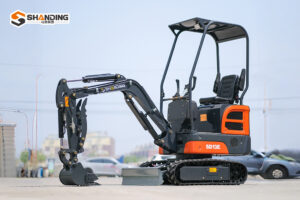With the deepening of globalisation and the increasing frequency of international trade, export business has become an important part of many enterprises. Against this backdrop, the role of logistics and handling equipment has become more and more prominent, and the rental market for handling equipment has also seen rapid development. The rise of the handling equipment rental market not only provides flexible and efficient logistics solutions for enterprises, but also has a profound impact on export trade.
The prosperity of the handling equipment leasing market is firstly reflected in the reduction of the operating costs of enterprises. The traditional purchase of handling equipment requires a large amount of capital investment, which is a considerable burden for small and medium-sized enterprises. By leasing handling equipment, enterprises can use it on demand, avoiding the occupation of a large amount of capital. This flexible leasing mode not only reduces the financial pressure of the enterprise, but also allows the enterprise to focus more on the development of the core business and enhance the overall competitiveness. In export trade, lower operating costs directly mean higher profit margins and more competitive prices, thus enhancing the competitiveness of enterprises in the international market.
The trend of modernisation and intelligence of handling equipment is also driving the development of export trade. Modern handling equipment such as automated forklift trucks and intelligent warehouse management systems not only improve logistics efficiency, but also reduce errors and losses caused by human operation. These advanced equipments are rapidly spreading through leasing services, enabling more enterprises to enjoy the dividends brought by technological upgrading. In the export segment, efficient handling equipment ensures that goods are loaded and unloaded quickly and safely, shortening logistics time and improving the overall efficiency of the supply chain. This not only helps to meet the requirements of international customers for delivery lead times, but also enhances customer satisfaction and further expands overseas markets.
Specialised and customised services in the handling equipment rental market have also injected new vitality into the export trade. Different industries have different needs for handling equipment. For example, the food industry needs hygienic and safe handling equipment, while the electronics industry needs anti-vibration and anti-static equipment. Rental companies meet the special needs of different industries by providing customised solutions. For exporters, this means being able to better protect their products, reduce loss and damage in transit, and improve the international image and market recognition of their products. Professional handling equipment can also help companies successfully pass various international certifications and inspections, reducing the risk of export due to unqualified equipment.
The development of handling equipment rental market also promotes the promotion of green logistics. With the enhancement of environmental protection consciousness, more and more enterprises begin to pay attention to the green supply chain construction. Electric handling equipment has gradually become the favourite in the market due to its advantages of low energy consumption and zero emission. Leasing electric handling equipment not only meets the requirements of environmental protection, but also reduces the carbon footprint of enterprises and improves their image. In the export process, enterprises adopting green logistics are more likely to win the trust and support of international customers, especially in markets with high environmental requirements such as Europe and the United States, where green logistics has become an important competitive advantage.
Although the handling equipment leasing market has brought many positive impacts on exports, there are also some challenges to be tackled. The quality of leasing services in the market varies, and some small leasing companies may lack professional technical support and service guarantee. This may lead to frequent equipment failures, affecting logistics efficiency and normal business operations. Therefore, enterprises need to carefully examine the qualifications and reputation of their leasing partners when choosing them. In addition, the detailed terms of the leasing contract need to be carefully reviewed to avoid potential legal risks and economic losses.
The development of the handling equipment leasing market has had a positive impact on exports in many ways, including reducing operating costs, improving logistics efficiency, meeting industry-specific needs and promoting green logistics. Enterprises should make full use of the advantages of this market and choose appropriate handling equipment leasing services to enhance their international competitiveness. At the same time, they also need to pay attention to the potential risks in the market to ensure the quality and reliability of leasing services. Through the rational use of handling equipment leasing resources, enterprises will be able to stand invincible in the fierce international market and achieve sustainable and stable export growth.




